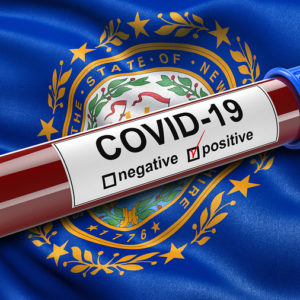During Friday’s COVID-19 presser, Gov. Chris Sununu was asked whether New Hampshire will be safe enough to reopen in time for Bike Week, Laconia’s wildly-popular (and extremely profitable) summertime event currently scheduled for June 13.
“I love Bike Week, it’s a really great opportunity for the state,” Sununu said. “It’s still down the road, we’re still about two months away, there’s still some time. We can try to hopefully get some new data and try to get something open in some fashion.” The question, Sununu added, is “how we can do it in a safe manner?”
Sorry, Gov. Sununu. There is no “safe.”
The debate over whether states like Georgia and Oklahoma are reopening parts of their economy “too soon,” as opposed to New Hampshire waiting until it’s “safe,” is based on a flawed premise — namely that there is a moment in the near term when Granite Staters can return to work and restaurants and worship services without risking illness or death from coronavirus.
We can’t. And waiting until Memorial Day, Labor Day or even New Year’s Day probably won’t change that fact.
Ask Dr. Anthony Fauci, director of the National Institute of Allergy and Infectious Diseases. “We will have coronavirus in the fall. I am convinced of that,” he said Wednesday.
Ask Dr. Tom Inglesby, Director of the Center for Health Security at Johns Hopkins University, who said Sunday, “wherever we are in the epidemic, this virus is going to be with us until we have a vaccine.”
And ask the head of the CDC, Dr. Robert Redfield. “There’s a possibility that the assault of the virus on our nation next winter will actually be even more difficult than the one we just went through. [emphasis added] We’re going to have the flu epidemic and the coronavirus epidemic at the same time.”
It’s depressing to think that, after all the damage we’ve inflicted on working families and small business owners, the result could be a worse winter in 2021 than we suffered through this year. How many Granite Staters understand that?
Yes, our extreme social distancing has “flattened the curve” and kept the number of hospitalizations manageable. But what we sometimes forget is that while the curve is flatter…it’s still the same length. The same number of COVID-19 victims, just over a longer period of time.
Which is why when former FDA chief Dr. Scott Gottlieb was asked about the right time to reopen the economy, he answered: “It’s going to take some time until we… get to the point where there’s a low-enough level of spread in the country that we could feel comfortable about opening up.”
Not “stop the virus” or “keep Americans safe.” Instead, the best we can do is “a low-enough level of spread.”
What “level” of ongoing coronavirus cases will Granite Staters accept as “low enough” to go back to work? To risk sending their kids to crowded schools? Twenty deaths a week? Ten? Any number higher than “zero?”
This is the public policy challenge facing our political leaders, says Yuval Levin, a member of the George W. Bush administration who worked on pandemic preparation and other health issues.
“There’s a deeper problem for our democracy: There is no way forward that involves doing what people want to do,” Levin told Commentary magazine. “Polls show that people don’t want to go back, and I’m sure that’s true. But holding on like this is not sustainable.”
Levin is right about the polls. People in New Hampshire and across the country say they aren’t willing to return to work or school. Nationwide, 80 percent of Americans say they support strict shelter-in-place policies. And in a new UNH poll, 88 percent of Granite Staters say it’s very or somewhat important to maintain the stay-at-home order.
“The simple fact that most people say they’d rather not [reopen the economy] at the moment isn’t important. What we should be demanding of our politicians now is not that they do what we want, but that they help us find a way to balance safety with the necessity of getting our economy moving so we don’t have the worst economic disaster in our history.
“That’s going to be hard. It’s going to involve doing things nobody wants to do,” Levin said.
Debates over whether that day should be in May, June or July merely keep the myth of an unattainable moment of safety alive, misleading the public about the true challenge ahead. What New Hampshire needs is for leaders to lay out the facts clearly and directly: Whenever our state reopens, there will be risks. Infection rates will rise.
Yes, we’re hoping to have a treatment to rescue the very worst cases. And we pray for a vaccine that can do to COVID-19 what Jonas Salk did to polio. But until then, every Granite Stater will still be living in a land with a new danger. Neighbors, co-workers, people they know will become new victims of the virus. Some will die.
We don’t want to live in a state where simply showing up for Bike Week is an act of courage. But in the era of COVID-19, there is no “safe.”

